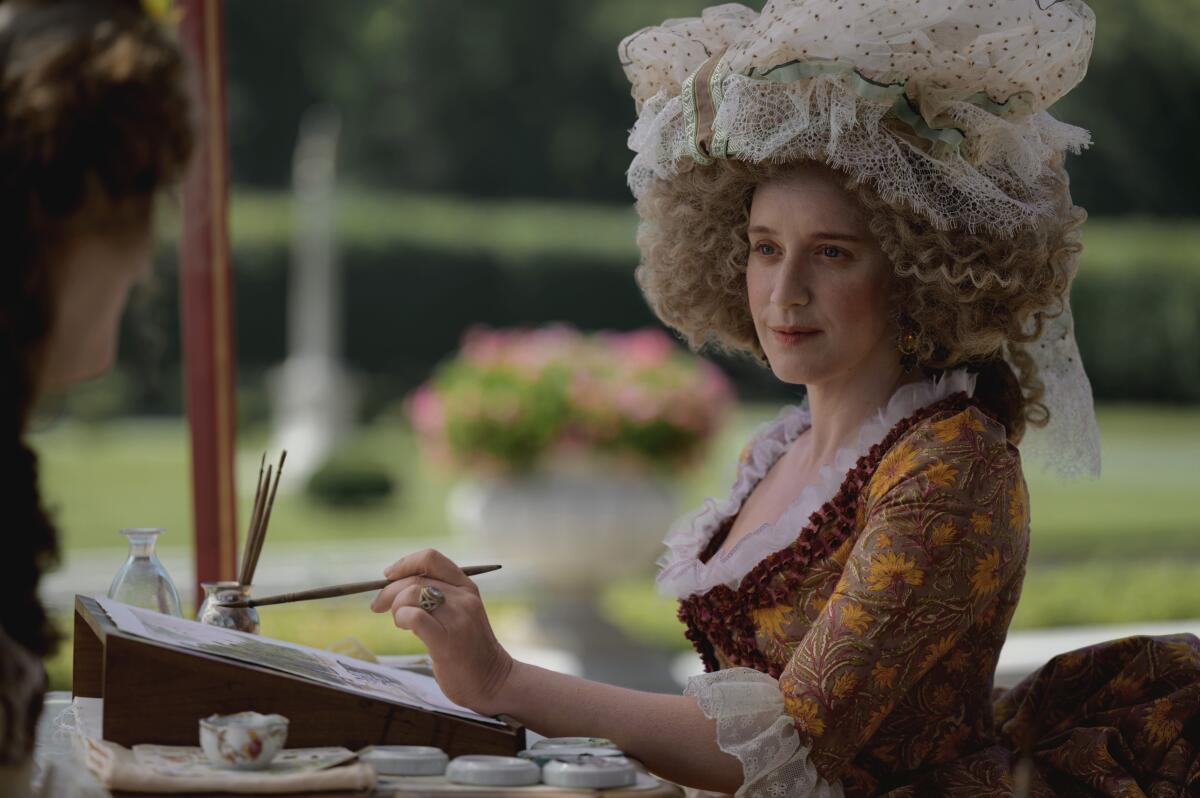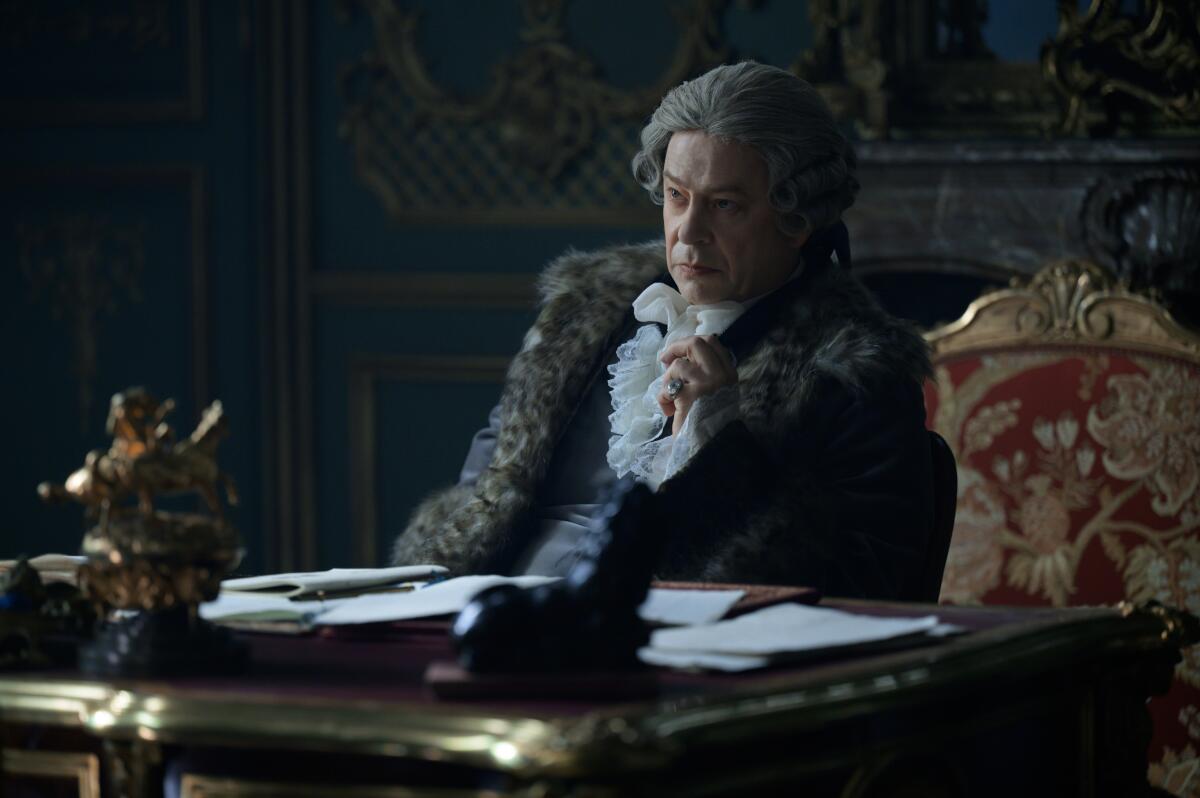Michael Douglas, star of “Romancing the Stone,” “Deadly Attraction,” “The American President” and a lot extra, is just not the actor one would consider as first in line to play portly, balding man on the cash Benjamin Franklin, however he has however accomplished simply that.
Within the very pleasing if not all the time convincing “Franklin,” which premieres Friday on Apple TV+ and follows the founding father via seven of the 9 years he spent in Paris, crafting an alliance with the French and negotiating a peace treaty with the British, he’s neither portly nor balding, however one thing of a hunk. Franklin’s notoriety in France has been recurrently in comparison with that of a “rock star,” at the very least since that was a time period, and although Douglas, 79, is technically too previous for the position — Franklin was 77 when the Treaty of Paris ended the Revolutionary Battle in 1783 — we stay in age of match septuagenarian pop idols, and Franklin, in his seventies, was reportedly catnip to girls. We would say, then, that the actor is taking part in the essence of the person, relatively than the shape.
Written high to backside by Kirk Ellis and Howard Korder and directed by Tim Van Patten, “Franklin” is predicated on Stacy Schiff’s 2005 energetic work of scholarship “A Nice Improvisation: Franklin, France and the Start of America” — which is to say, it borrows its analysis, adjustments some issues, leaves a lot out and provides a bunch of stuff, as such initiatives have accomplished earlier than the films may speak. It’s a good-looking manufacturing, a feast for the costumers, the hair and make-up artists, the manufacturing designers and set decorators. The group scenes are properly populated, which I ever regard as an indication of seriousness on the a part of the producers, or whoever writes the checks to make that so. And the toy-theater credit are so good I watched them with shut consideration each time.
The eight-episode sequence begins in December 1776 as Franklin and his teenage grandson, Temple (Noah Jupe), who has come alongside to behave as his secretary, are rowed ashore in Brittany on a chilly and windy evening. They make their strategy to Paris, the place Franklin’s coach is mired in admiring crowds.
“They’ve it of their heads that I invented electrical energy,” Franklin explains. “Who am I to dissuade them?”

Anne Louise Brillon de Jouy (Ludivine Sagnier) in a scene from “Franklin.”
(Apple TV+)
The Franklins alight into the corporate of Edward Bancroft (Daniel Mays), who on this telling is conceived as Ben’s bosom buddy, private doctor and nonspecific someday assistant, and (factually) a person with a secret. Different gamers are step by step launched, portrayed with varied levels of historic constancy. Having been instructed that he has connections at Versailles, Franklin approaches Pierre-Augustin Caron de Beaumarchais (Assaad Bouab) as he rehearses considered one of his “Figaro” performs. (There are some good evocations of late 18th century present enterprise via the sequence.) Beaumarchais, an exuberant kind who has a behavior of referring to himself within the third individual, is excessive on the American venture and, when not plopped down within the prompter’s field, will smuggle arms to the rebels.
The rich service provider Jacques-Donatien Le Ray de Chaumont (Olivier Claverie) will lodge the Franklin celebration in a wing of his Passy property, west of Paris, for the length, the place Franklin will set up a printing press and get chummy together with his pretty neighbors: unhappily married Anne Louise Brillon de Jouy (Ludivine Sagnier), who performs the harpsichord and sits with him within the park making up tales about passersby like Woody and Diane in “Annie Corridor”; and Anne Louise’s free-spirited, freethinking rival for his profligate affections, Anne-Catherine de Ligniville, Madame Helvétius (Jeanne Balibar), for whom he performs upon his well-known glass armonica.
“You’re terribly historical,” she coos to him, “however you continue to have most of your hair.”
“Maybe you’d wish to fluff it,” Franklin replies.
Among the many wining and eating, some work will get accomplished. Thibault de Montalembert (Mathias from “Name My Agent”) performs Louis XVI’s international minister Charles Gravier, comte de Vergennes, the person Franklin has to persuade to get the king to come back to his aspect. De Montalembert’s considerably weary authority makes De Vergennes appear to be a totally fashioned human, greater than many of the characters right here; it’s an unusually heat efficiency for an individual whose scenes are nearly completely centered on political gamesmanship. (That he has a sensible spouse, performed by Isabelle Candelier, whose recommendation he takes, on work and clothes, makes us like him much more.) A lot of Douglas’ finest scenes are performed reverse him.

Thibault de Montalembert performs Louis XVI’s international minister, Charles Gravier, comte de Vergennes, in “Franklin.”
(Apple TV+)
If the sequence does a radical job of picturing the highlights of Franklin’s time in Paris, with its romance, intrigue and salon diplomacy — a topic colourful sufficient that it grew to become a Broadway musical, the 1964 “Ben Franklin in Paris,” with “Music Man” Robert Preston within the title position — it’s much less profitable when following Temple’s largely imagined adventures. I’d guess that sooner or later within the sequence’ growth the grandfather-grandson relationship appeared a worthwhile peg on which to hold the narrative. And there was real-life drama within the household, involving Franklin’s son and Temple’s father, William Franklin, the royal governor of New Jersey, who supported the crown and plotted towards the People, inflicting a rift by no means to heal, which is cataloged right here if not explored. There may be “errata in each man’s life,” says Franklin, ever the Philadelphia printer, when his grandson accuses him — pretty, unfairly, who’re we to evaluate — of being a nasty husband, father or mother, and many others.
However the Temple storyline, which runs for essentially the most half on a separate monitor from Franklin’s and occupies a great deal of display screen time, appears designed primarily to get some roistering younger folks right into a sequence dominated by sedentary middle-age and aged people. Horses are ridden, swords drawn, revelry reveled.
Invention is unavoidable in such a venture, however the plotting round Temple feels more and more unlikely — even within the fictionalized context it’s too goofy by half — to the purpose that the character himself turns into annoying. He falls in with not a lot unhealthy as boisterous companions, of whom essentially the most critical is Gilbert du Motier, Marquis de Lafayette (Théodore Pellerin), itching to get to America and kill British troopers. His buddies fill his head with notions and mud his face with powder, and Paris, towards whose temptations his grandfather has warned him, does the remainder. It’s like a teenage “Rake’s Progress.” Will Temple come to his senses in time to witness the Treaty of Paris, concluded with late-arriving John Adams (Eddie Marsan), Franklin’s temperamental nemesis — his frenemesis — ceaselessly incensed over what he sees because the older man’s devil-may-care perspective to simply about every part?
Douglas has opted for a surprisingly dry, deliberate supply, which, for all anybody is aware of, is likely to be precisely the best way Franklin spoke. (The Ben I hear in my head is the one performed by Stan Freberg on his album “Stan Freberg Presents the US of America Quantity One: The Early Years,” and that’s certainly not correct.) Paradoxically — or maybe not, since we’re in Paris the place Franklin is the foreigner — this “pure” American, who eschews the fripperies of modern gown for a trapper’s fur hat and easy fabric clothes, comes off just a little stiff. Or maybe he’s being delicate. His most dynamic scenes present him working wordlessly at his printing press; they provide us a style of Franklin’s functionality and Douglas’ personal.
And as to Franklin’s chronologically asymmetrical flirtations, properly, let’s keep in mind who’s married to Catherine Zeta-Jones.
